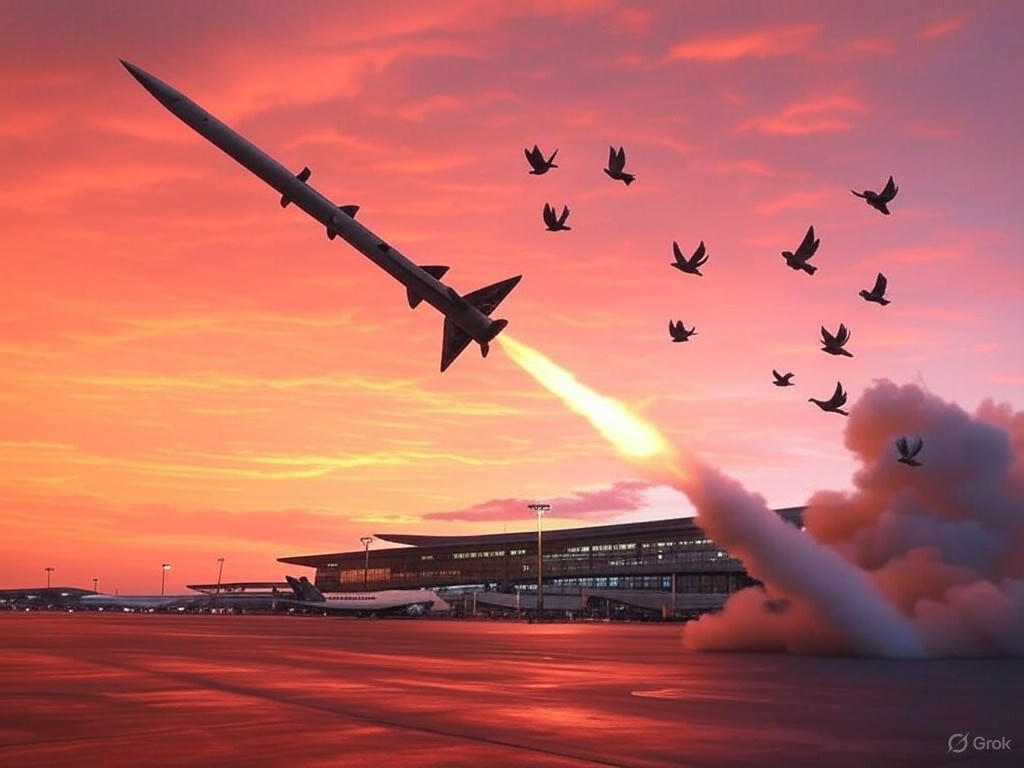
Netanyahu Warns of Multiple Strikes After Houthi Attack
In the midst of rising tensions in the Middle East, a Netanyahu Houthi attack has sparked urgent warnings from Israeli Prime Minister Benjamin Netanyahu, promising forceful retaliation against Yemen’s Houthi rebels and their Iranian supporters. This incident, involving a missile strike on Ben Gurion Airport, underscores the fragile balance of power in the region and the potential for wider conflict. As world leaders watch closely, Netanyahu’s statements highlight Israel’s resolve to defend its borders and citizens.
Missile Strike Targets Ben Gurion Airport
On Sunday, May 4, 2025, Houthi rebels in Yemen fired a ballistic missile that landed perilously close to Ben Gurion Airport, Israel’s key international gateway. The attack triggered chaos, with passengers scrambling for safety and flights grinding to a halt amid the panic. What makes this Netanyahu Houthi attack particularly alarming is its precision and the broader implications for civilian infrastructure.
Brigadier General Yahya Saree claimed responsibility in a video, boasting about launching a hypersonic missile as part of the Houthis’ ongoing campaign against Israel. This escalation stems from the fallout of the October 7, 2023 Hamas attack, with the Houthis launching around 27 ballistic missiles and drones since March 18. Only about half have reached Israeli airspace, but even those falling short serve as a stark reminder of the growing threat.
Netanyahu’s Dual Threats to Houthis and Iran
Right after the Netanyahu Houthi attack, Prime Minister Netanyahu didn’t hold back, vowing strong retaliation against both the rebels and Iran in public addresses. Speaking with Cypriot President Nikos Christodoulides, he declared that Israel and the world face a common enemy in the Houthis, and his government won’t stand idly by. It’s a bold stance that reflects the high stakes involved.
Netanyahu pointed fingers at Iran as the real puppet master, emphasizing in his statements that any action would address this root cause. On social media, he reinforced, “Attacks by the Houthis emanate from Iran. Israel will respond to the Houthi attack against our main airport and, at a time and place of our choosing, to their Iranian terror masters.” This rhetoric not only escalates the situation but also signals a calculated approach to defense.
Alignment with US Position
Netanyahu echoed sentiments from US President Donald Trump, who blamed Iran for Houthi actions and promised severe repercussions. Trump’s post on Truth Social labeled every Houthi shot as an Iranian one, and Netanyahu quickly agreed, saying, “President Trump is absolutely right.” Have you ever wondered how such alignments between nations can shape global responses? This unity between the US and Israel could lead to coordinated efforts against shared threats.
Israel’s Shifting Response Strategy
Israeli officials are rethinking their strategy following the Netanyahu Houthi attack, moving away from previous restraint. Reports from The Jerusalem Post indicate that Israel might directly target Yemen, reversing a policy influenced by US requests to hold back. It’s a pivotal shift, driven by the understanding that passivity isn’t an option anymore.
Until recently, Israel avoided strikes on Yemen to let the US take the lead, but that dynamic is changing. An official noted that Washington now acknowledges Israel’s need to act, stating, “The administration has never vetoed an Israeli strike, but now they see we can’t remain passive.” This evolution in policy could redefine regional alliances and responses.
Previous Responses to Houthi Attacks
Israel has struck Houthi targets five times since the Gaza war began, but activity halted after a hostage deal and under the new US administration. Meanwhile, the US has ramped up its own operations, conducting over 1,000 strikes on Houthi infrastructure. A hypothetical scenario: If these efforts fail to deter further attacks, how might Israel’s direct involvement alter the outcome? It’s a question that keeps experts pondering the next move.
Cabinet Approval and Potential Military Actions
Israel’s security cabinet met swiftly after the Netanyahu Houthi attack to greenlight a response, tying it into ongoing discussions about Gaza operations. Netanyahu’s cryptic words, “It’s not bang, bang and we’re done, but there will be bangs,” hint at a multi-step strategy rather than a quick retaliation. This approach aims to send a clear message without rushing into chaos.
The Israeli Foreign Ministry echoed this, calling out Iran for using proxies like the Houthis to destabilize the region. As tensions mount, one thing’s for sure: Israel’s right to self-defense will be exercised on its terms. For readers following this closely, consider how such decisions impact everyday life in the Middle East.
Broader Context of Regional Conflict
The Netanyahu Houthi attack doesn’t exist in isolation; it’s woven into the fabric of the ongoing Gaza war, which has seen intensified IDF operations. Over the past weekend, strikes hit more than 100 targets in Gaza, reflecting Israel’s broader campaign against Hamas. This interconnectedness raises the risk of a larger confrontation.
Escalating Gaza Operations
Anonymous Israeli officials revealed plans for cabinet votes on expanding Gaza fights, aiming to dismantle infrastructure both above and below ground. The conflict traces back to the October 7, 2023 attack, which claimed 1,200 lives and took hostages, with 59 still held. Tragically, Palestinian health officials report over 52,000 casualties, displacing most of Gaza’s population and exacerbating shortages. It’s a heartbreaking reality that affects families on all sides—have you thought about how prolonged conflicts ripple through communities?
Houthi Motivation and Capabilities
The Houthis, driven by slogans of defiance against America and Israel, justify their attacks as solidarity with Palestinians. Their campaign started in November 2023, shortly after the Hamas assault, and has grown more sophisticated. The ability to strike distances as far as Israel shows their advancing missile tech, which has occasionally evaded defenses—another layer to the Netanyahu Houthi attack narrative.
Impact on Israeli Civilians
These attacks aren’t just numbers; they’re disrupting daily life for hundreds of thousands of Israelis. Sirens blare at all hours, forcing people into shelters and causing injuries from falls or debris. Imagine hearing that alarm in the middle of the night—what would you do? This human element underscores the urgency of Netanyahu’s warnings.
International Implications
On the global stage, the Netanyahu Houthi attack and Israel’s response could reshape alliances, with the US firmly backing retaliation against Iran. President Trump’s threats of “dire consequences” for Tehran highlight a united front against proxy warfare. Yet, this solidarity comes with risks, like disruptions to Red Sea shipping routes affecting worldwide trade.
Regional Stability Concerns
Potential strikes on Yemen or Iran threaten to unravel regional peace, possibly sparking a domino effect with other Iranian proxies. Shipping companies are already rerouting vessels around Africa, hiking costs and delays—a tangible impact on global commerce. For businesses relying on these routes, it’s a wake-up call to prepare for volatility.
Looking Ahead: Potential Scenarios
As Israel weighs its options post-Netanyahu Houthi attack, scenarios range from targeted Houthi strikes in Yemen to bolder moves against Iranian assets. A more aggressive path might involve hitting targets in Syria or Lebanon, but everything hinges on strategic timing. Netanyahu’s emphasis on choosing the moment suggests a measured, not impulsive, response.
One piece of advice for staying informed: Follow reliable news sources and consider how these events might influence energy prices or international relations. It’ll help you navigate the headlines with confidence.
Conclusion
The Netanyahu Houthi attack on Ben Gurion Airport has ignited a firestorm of warnings from Prime Minister Netanyahu, signaling Israel’s intent to strike back at the Houthis and Iran. With cabinet approvals in place and US support, the coming days could see calculated military actions that reshape the Middle East. As we reflect on this, what’s your take on how the world should respond to such escalations? Share your thoughts in the comments below, and explore our related articles on regional conflicts for more insights.
References
1. “Netanyahu threatens Houthis and Iran as cabinet convenes after missile hits airport.” Times of Israel.
2. “Netanyahu: Israel will respond to both Houthis and Iran at time of our choosing.” Times of Israel.
3. “Netanyahu vows to retaliate against Houthis and Iran after missile attack.” Sky News.
4. Live updates from The Jerusalem Post on May 4, 2025.
5. Additional article from The Jerusalem Post.
6. “Missile fired by Houthis halts flights in Israel ahead of cabinet vote on intensifying Gaza war.” PBS NewsHour.
Netanyahu Houthi attack, Israel Iran conflict, Ben Gurion missile attack, Houthi Yemen strikes, Israel retaliation plans, Netanyahu warnings, Middle East tensions, Iranian proxies, Gaza war escalation, Regional security threats






